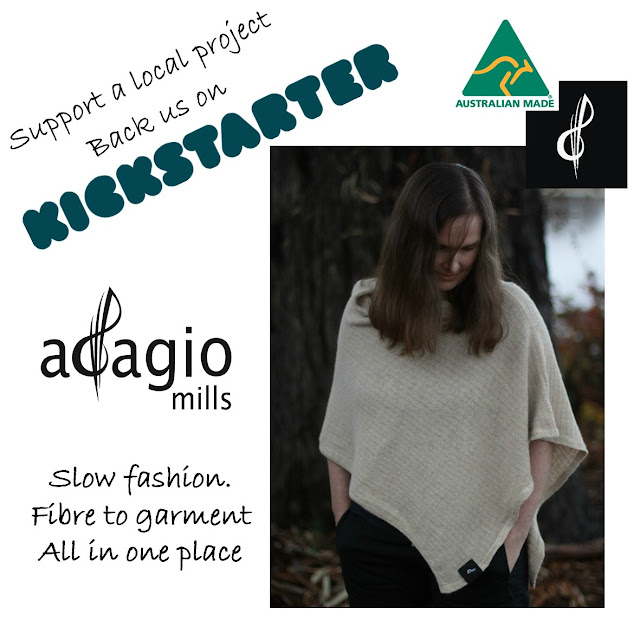
I started this blog post as a social media post and very quickly worked out that this topic deserves a longer discussion than just a few sentences thrown out into social media space.
Slow Fashion for us is an extension of the Slow Food movement and is part of the reason we love living where we do, the Central West of NSW. This area is known as a "food basket" and is very aptly named with volcanic soils it is perfect for growing food. We love to buy our food as locally as possible and know who grew it whenever possible. For example we buy our fruit from our neighbour, our orange juice comes from Narromine, meat from our own property and our local butcher that has their own farms and our dairy products from The Little Big Dairy in Dubbo. It's part of what makes our community circle. We find community isn't just limited to a geographical area but more about the people and businesses you know and understand.

It is not always possible to be able to make these choices or even have the information to make these choices but I am a firm believer that in making small choices wherever you can it can make a difference.
Extending these choices from Slow Food to Slow Fashion becomes even more difficult as so much of our manufacturing is now done overseas.
The Wikipedia definition of Slow Fashion is

Fairness for both consumers and producers is a very important part of Slow Fashion. It touches on an overall responsibility for the whole process of manufacturing clothes. In fairness it needs to include suitable conditions for workers and the overall supply chain for the products, including the growers of the raw fibres. It needs to acknowledge that cost is a driving factor and that to survive the producer needs to be able to make a margin but I think it also includes a responsibility of the manufacturer to not undertake activities that the consumer would object to, such as polluting the environment or endangering team members. Transparency is not always able to be achieved but all consumers would object to buying something that takes advantage of people, damaged waterways or poisoned fish or animals. This is not to say that all manufacturing overseas does this but that we have lost the transparency and therefore also the accountability.
Sometimes it is all too easy to buy the multiples of cheap items available to us today and be so removed from the process that these factors are no longer real to us. We forget that it is the consumer that will drive the behavior of the producers. For so long cost has been the primary driving factor in purchase decisions for the vast majority of consumers so is it no wonder that the producers have found ways to give us what we are asking for?
Australia can be proud that it has comparatively high labour rates however that makes it very difficult to run a manufacturing business. So when we are choosing to buy our "stuff" whether it be food, clothing, toys or otherwise we need to seriously consider buying something made ethically as well as something which will last. Or one day we will wake up and there will be nothing left being manufactured or grown here, rubbish tips will be full of disposed items and wonder why there are no more jobs (other than rehabilitation of tips) and a deteriorating community?
The reality even for us is that we have 3 small children, many costs in starting a new business and the same living costs as everyone else. So making ethical choices is hard. And is it not always clear what the ethical choice is.
I can't always buy from companies that I can trace their sources or even when I can trace I may not be able to afford their products but I strongly believe that the choices I do make will make a difference.
In addition to the small everyday choices that we make, we also made a very big choice. We started Adagio Mills. We can not describe how difficult this road has been. Until we lived this choice, whilst we knew about the difficulties and constraints on running a manufacturing business in Australia, it wasn't completely "real" to us. Paying our staff appropriately as well as all the other requirements such as super and worker's compensation is more difficult than we could have ever imagined.
Adagio Mills at the moment makes knitting yarn from natural fibres. We provide local, regional employment and are as environmentally friendly as we can be, even choosing to use the timeless qualities of the natural colours of the fibres instead of using dyes. We are regularly out and about in the community promoting this business and so many people come past us and give us a fantastic pat on the back. "We love what you do" they say or "We need more people like you" they say. Then walk away without buying anything. Not even a token ball of yarn to give as a present to someone. This is devastating to a business like ours. As much as we like the compliment and the words of support, we can't just pay our team compliments.
We have started our second crowdfunding campaign to generate interest and presales of garments to help us obtain a knitting machine. We hope that this will help us to expand our market and help us to be here for the future. If you would like to find our more about it there is more information at this link, we definitely need your help.
So even if what we do doesn't necessarily appeal to you, please in your everyday choices, consider Slow Fashion and Slow Food. Make the small choices (or the large ones) that make a difference to farmers and other businesses local to you and help keep the community together.


